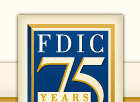Remarks by FDIC Chairman Sheila C. Bair at the 75th
Anniversary "Face Your Finances" Road Show Event
Chicago, IL - July 16, 2008
Good afternoon and thank you for joining us today.
I hope you enjoyed your lunch and had a chance to chat with the other folks at your table about what's happening these days in the world of money and personal finance.
There are a lot of great folks here today, and we have an excellent panel to guide the discussion.
Before we get started I want to take a moment to recognize our local community affairs staff.
They're our boots on the ground here in Chicago. They've been very involved in the planning of this event. I thank you all for your hard work.
We meet at a very critical time for the American economy. There is a lot of uncertainty out there.
People are worried about their jobs, paying their bills, and keeping their homes. Higher prices for food and gasoline are making it harder for families to make ends meet. On top of that, while the overall banking system is sound, some banks are under stress.
The latest example of this came a few days ago with the failure of IndyMac.
While it may have been one of the largest bank failures on record, FDIC staff worked very hard to reopen IndyMac on Monday morning for business as usual. Over the weekend when the FDIC took over the bank, people had access to their cash via ATM, debit card, or by writing a check. On Monday, full service was restored. In short, the system worked as it's supposed to work.
Not one of IndyMac's more than 200,000 customers lost a single penny of their insured deposits.
And the small number of customers who were over the limits are still covered for insured amounts, and had immediate access to half of their uninsured money. And as assets of IndyMac are sold, they may receive even more.
IndyMac is a reminder to all of us that every consumer - young or old; rich or not so rich, needs to know about deposit insurance, and needs to know how to handle their money wisely.
They need to know how to access safe, traditional banking services - what types of accounts suit their needs the best, how to avoid high fees, and how to save to buy a home and to build wealth.
Today there is a tremendous thirst among consumers for knowledge.
- The calls to our consumer hotline are double from a year ago, with many people calling about whether their money is protected by deposit insurance.
- Calls spiked over the weekend with the IndyMac failure. When told that her money at IndyMac was insured, one relieved caller said: "You mean I don't have to do anything? Now I'll have a better weekend."
- I was in Los Angles a few months ago at a workshop for people facing foreclosure. The people were lined up around the block waiting to get in and to talk to credit counselors and lenders about how best to fix their mortgages. These were families … homeowners who needed more information and a little educating about what makes for a sensible and affordable mortgage.
75 years of success
This year is the FDIC's 75th anniversary.
We've been protecting people's money since the Great Depression. And like we saw this past weekend, because of what we do - not a single penny of insured deposits has been lost during those 75 years.
We're the oldest and largest deposit insurer in the world. And our system has worked so well over the years that today 100 nations now have some form of coverage.
We thought that our 75th birthday would be a very good time to renew our message of confidence and stability, and to reacquaint the American people with the virtues of deposit insurance.
One of the ways that we're doing it is by holding town-hall style panel sessions throughout the county. And I'm delighted that we're starting out these sessions here in Chicago-land.
Chicago is one of the most diverse and active communities in the country.
And people from Chicago are straight-talkers, who tell it like it is.
(I very much appreciate that. I grew up in Kansas. And the only way Kansasians know how to do business is by being very direct!)
So I expect to walk away from here with a bundle of new insights and innovative ideas for bringing more consumers into the financial mainstream and teaching them how to do it.
Key questions
We'll be asking you to consider a couple of key questions during the discussion.
- What are the obstacles to opening a bank account?
- Which kinds of bank accounts can best maximize wealth accumulation?
- What kinds of financial education can best help people make good judgments about taking out a mortgage or saving for retirement?
- What are bankers saying about the biggest roadblocks that consumers face in building assets and tapping mainstream banking?
We want you to think about solutions to these problems not only for Chicago, but also for the rest of the country.
75th Anniversary campaign
Before we get to the panel discussion, I want to explain why and how we're marking the FDIC's 75th anniversary with a series of national news events and projects. All are aimed at protecting our economic democracy for the next 75 years.
We're very proud of our history and what we've accomplished.
We've built confidence and stability into the American economy by keeping the banking system stable and secure, and by making sure there's a safety net for the average American in the form of deposit insurance.
Everyone who walks into a bank that displays the "MEMBER-FDIC" logo knows that an FDIC-insured checking account, savings account, or individual retirement account - is the safest place in the world to put your money.
On June 16, 2008 we launched a national campaign to raise public awareness about deposit insurance. We picked June 16 because it was 75 years to the day that President Roosevelt signed the law that created the FDIC.
The campaign includes advertisements in major newspapers, magazines, lifestyle publications and on the internet.
The ads are designed to help explain how basic deposit insurance works - what the limits are, and where consumers can get additional information.
I hope everyone here today will visit our new 75th Anniversary web site to get all the details.
You'll find information on many other aspects of the campaign, including:
- For consumers, a new, easy-to-understand, one-page rundown on how deposit insurance works, and what the limits are. (This is a work in progress so we'd like any comments you might have.)
- You can also learn more on the website about a new consumer education awards program for the best new ideas for expanding financial literacy.
With that, let's get started with the panel discussion.
We're privileged to have a panel rich in knowledge and experience in banking and personal finance.
On the panel today are:
- Terry Savage, a nationally known expert on personal finance, best-selling author and a regular television commentator on issues related to investing and financial markets. She is the nationally syndicated personal finance columnist for the Chicago Sun-Times.
Terry's most recent book is The Savage Number: How Much Money Do You Need to Retire?
Her previous best-seller, The Savage Truth on Money, was named one of the ten best money books of the year by Amazon.com, and was made into an hour-long television special that aired on PBS.
- Dory Rand is president of the Woodstock Institute, a Chicago-based policy and advocacy nonprofit that works locally, nationally, and internationally to promote community reinvestment and economic development in lower-income and minority communities. In fact, today is her first day on the job!
Dory joins the Woodstock Institute after 16 years at the Sargent Shriver National Center on Poverty Law here in Chicago.
Dory is a long-time advocate for lower-income people and an expert on welfare law and public policy issues at the local, state, and national levels.
- Jennifer Tescher is the Director of the Center for Financial Services Innovation (CFSI). With Jennifer at the helm, CFSI was launched in 2004 to bring together the financial services industry to develop, test, and implement new ways of building long-term, profitable relationships with under-banked consumers.
Jennifer is a nationally known expert on this topic, with a monthly column in the American Banker, frequent interviews and articles in the financial services press, and major speaking engagements.
- Michael Burnside is a CRA Officer for Allstate Bank. He is the first CRA Officer for the bank and began in October 2001.
He is a 33 year employee of the Allstate Corporation and is also a Founding Pastor of the New Name Baptist Church where he has served for 21 years.
- Thomas P. FitzGibbon, Jr. is the Executive Vice President of the $8.3 billion Chicago-based MB Financial Bank. He also serves as the President of MB Financial Community Development Corporation (MBCDC), a $4 million equity subsidiary of the bank he started in 1995, and as President of the MB Charitable Foundation.
In addition to CRA compliance consulting services for local banks, they originate loans and prepare grant applications for various purposes, including: affordable rental housing … and affordable loans for home buyers and businesses that serve low- and moderate-income markets.

Chicago
July 16, 2008
San Francisco
July 22, 2008
Dallas
September 10, 2008
New York City
September 19, 2008
Kansas City
April 7, 2009
